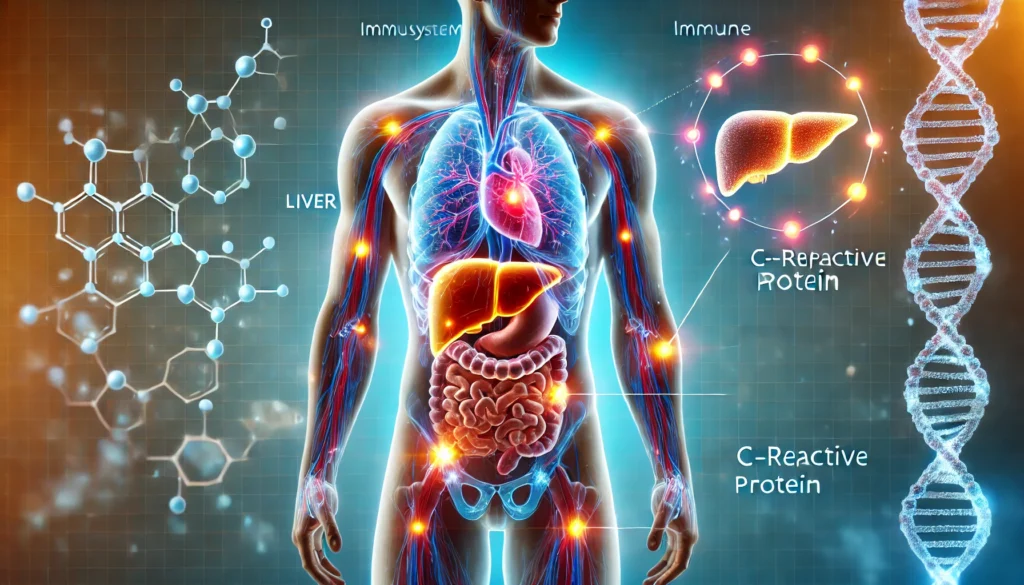هل سبق لك أن سمعت عن CRP وتساءلت عما يعنيه؟ CRP، أو البروتين التفاعلي-C، هو مادة ينتجها الكبد عند وجود التهاب في جسمك. غالبًا ما يتحقق الأطباء من مستويات CRP لمعرفة ما إذا كنت تعاني من عدوى أو التهاب أو مشاكل صحية أخرى. ولكن ماذا يعني انخفاض مستويات CRP لديك؟ هل هذا أمر جيد؟ دعونا نوضح ذلك بطريقة سهلة الفهم!
في هذه المقالة، سنستكشف ما هو CRP، وما الذي يسبب انخفاض مستويات CRP، ولماذا هو مهم لصحتك. سنجيب أيضًا على بعض الأسئلة الشائعة ونقدم لك نصائح حول كيفية الحفاظ على مستويات الالتهاب لديك تحت السيطرة. هل أنت مستعد؟ هيا بنا نتعمق!
ما هو CRP، ولماذا هو مهم؟
CRP هو اختصار لـ C-reactive protein. إنه بروتين ينتجه الكبد عند وجود التهاب في جسمك. الالتهاب هو طريقة جسمك في مكافحة العدوى أو الإصابات أو الأمراض. تخيل الأمر كما لو كان جهاز الإنذار في جسمك ينطلق عند حدوث أي مشكلة.
يقوم الأطباء غالبًا بفحص مستويات بروتين سي التفاعلي (CRP) من أجل:
التحقق من وجود عدوى (مثل العدوى البكتيرية أو الفيروسية).
مراقبة الأمراض المزمنة (مثل التهاب المفاصل أو الذئبة).
تقييم خطر الإصابة بأمراض القلب.
يتم قياس مستويات بروتين سي التفاعلي (CRP) بفحص دم بسيط. إليك ما تعنيه النتائج عادةً:
مستوى بروتين سي التفاعلي الطبيعي: أقل من 10 ملغم/لتر.
مستوى بروتين سي التفاعلي المرتفع: أعلى من 10 ملغم/لتر (يشير إلى التهاب أو عدوى).
مستوى بروتين سي التفاعلي المنخفض: أقل من 1 ملغم/لتر (عادةً ما يكون مؤشرًا جيدًا!).
ما الذي يسبب انخفاض مستويات بروتين سي التفاعلي؟
انخفاض مستويات بروتين سي التفاعلي أمر جيد بشكل عام! فهو يعني أن جسمك لا يتعامل مع الكثير من الالتهابات. ولكن دعونا نلقي نظرة على بعض الأسباب المحددة التي قد تؤدي إلى انخفاض مستوى بروتين سي التفاعلي لديك:
- أنت بصحة جيدة وخالٍ من الالتهابات
إذا كنت تتمتع بصحة جيدة، فمن المرجح أن تكون مستويات بروتين سي التفاعلي لديك منخفضة. هذا يعني أن جسمك لا يقاوم العدوى أو يتعامل مع الالتهاب المزمن. استمر في العمل الجيد!
- لديك جهاز مناعة قوي
يمكن لجهاز المناعة القوي أن يسيطر على الالتهاب، مما يؤدي إلى انخفاض مستويات البروتين التفاعلي سي (CRP). يمكن أن يساعد اتباع نظام غذائي متوازن وممارسة الرياضة والحصول على قسط كافٍ من النوم على تعزيز جهاز المناعة لديك.
- تتناول أدوية مضادة للالتهابات
إذا كنت تتناول أدوية مثل الإيبوبروفين أو الأسبرين، فيمكنها تقليل الالتهاب وخفض مستويات البروتين التفاعلي سي (CRP). استشر طبيبك دائمًا قبل بدء أو إيقاف أي أدوية.
- لديك عامل وراثي
يعاني بعض الأشخاص بشكل طبيعي من انخفاض مستويات البروتين التفاعلي سي (CRP) بسبب جيناتهم. إذا كانت عائلتك تميل إلى انخفاض مستويات البروتين التفاعلي سي (CRP)، فقد تعاني أنت أيضًا!
- تعيش نمط حياة صحي
يمكن أن يساعد اتباع نظام غذائي غني بالفواكه والخضروات والحبوب الكاملة وممارسة الرياضة بانتظام وتجنب التدخين في الحفاظ على انخفاض الالتهاب (ومستويات البروتين التفاعلي سي)
هل انخفاض مستوى بروتين سي التفاعلي (CRP) أمر جيد دائمًا؟
في أغلب الأحيان، يُعد انخفاض مستوى بروتين سي التفاعلي (CRP) علامة على صحة جيدة. ولكن في حالات نادرة، قد يكون الانخفاض الشديد في مستويات بروتين سي التفاعلي (CRP) مدعاة للقلق. على سبيل المثال:
مشاكل الكبد: بما أن الكبد يُنتج بروتين سي التفاعلي (CRP)، فقد تُسبب أمراض الكبد أحيانًا انخفاض مستويات بروتين سي التفاعلي (CRP).
سوء التغذية: قد يؤثر عدم الحصول على ما يكفي من العناصر الغذائية على قدرة الكبد على إنتاج بروتين سي التفاعلي (CRP).
بعض الأدوية: قد تُخفض بعض الأدوية، مثل الستاتينات، مستويات بروتين سي التفاعلي (CRP).
إذا كانت مستويات بروتين سي التفاعلي (CRP) لديك منخفضة للغاية وكنت تعاني من أعراض أخرى (مثل التعب أو فقدان الوزن)، فاستشر طبيبك. يُمكنه مُساعدتك في معرفة سبب المشكلة.
كيفية الحفاظ على مستويات بروتين سي التفاعلي (CRP) لديك صحية
هل تُريد الحفاظ على مستويات بروتين سي التفاعلي (CRP) لديك ضمن المعدل الطبيعي؟ إليك بعض النصائح:
- اتباع نظام غذائي مُضاد للالتهابات
ركز على الأطعمة التي تُحارب الالتهابات، مثل:
الفواكه (التوت، البرتقال، التفاح).
الخضراوات (السبانخ، الكرنب، البروكلي).
الحبوب الكاملة (الشوفان، الأرز البني، الكينوا).
الدهون الصحية (زيت الزيتون، الأفوكادو، المكسرات).
تجنب الأطعمة المصنعة، والمشروبات السكرية، والإفراط في تناول اللحوم الحمراء، التي قد تزيد من الالتهاب.
- ممارسة الرياضة بانتظام
يساعد النشاط البدني على تقليل الالتهاب ويحافظ على قوة جهاز المناعة. استهدف ممارسة 30 دقيقة على الأقل من التمارين المعتدلة (مثل المشي أو ركوب الدراجات) معظم أيام الأسبوع.
- الحصول على قسط كافٍ من النوم
قد يؤدي قلة النوم إلى زيادة الالتهاب ورفع مستويات البروتين التفاعلي سي (CRP). حاول الحصول على 7-9 ساعات من النوم الجيد كل ليلة.
- التحكم في التوتر
قد يؤدي التوتر المزمن إلى الالتهاب. مارس تقنيات الاسترخاء مثل التنفس العميق، أو اليوغا، أو التأمل.
- تجنب التدخين والحد من تناول الكحول
قد يؤدي التدخين والإفراط في شرب الكحول إلى زيادة الالتهاب ورفع مستويات البروتين التفاعلي سي (CRP). الإقلاع عن التدخين وشرب الكحول باعتدال يُساعد في الحفاظ على مستويات CRP لديك ضمن المعدل الطبيعي.
متى يجب فحص مستويات CRP لديك؟
قد يُوصي طبيبك بإجراء فحص CRP إذا:
كنت تعاني من أعراض عدوى (مثل الحمى أو التعب).
كنت تُعاني من حالة مرضية مزمنة (مثل التهاب المفاصل أو الذئبة).
سيُقيّم طبيبك خطر إصابتك بأمراض القلب.
إذا كانت مستويات CRP لديك منخفضة، فهذه عادةً علامة جيدة. أما إذا كانت مرتفعة، فقد يُوصي طبيبك بإجراء المزيد من الفحوصات لمعرفة السبب.
أسئلة شائعة حول CRP
- هل يُمكن أن يُسبب التوتر ارتفاع مستويات CRP؟
نعم! يُمكن أن يُزيد التوتر المزمن من الالتهاب ويرفع مستويات CRP.
- هل يُمكن أن يُؤثر النظام الغذائي على مستويات CRP؟
بالتأكيد. يُمكن أن يُؤدي اتباع نظام غذائي غني بالأطعمة المُصنّعة والسكريات إلى زيادة الالتهاب، بينما يُمكن أن يُخفض النظام الغذائي المُضاد للالتهابات مستويات CRP.
- هل CRP هو نفسه مُعدّل ترسيب كرات الدم الحمراء (ESR)؟
لا، يُعدّ كلٌّ من البروتين التفاعلي CRP ومعدل ترسيب كريات الدم الحمراء ESR مؤشرين للالتهاب، لكنهما يقيسان أشياءً مختلفة. يُعدّ البروتين التفاعلي CRP أكثر حساسيةً ويتغير أسرع من معدل ترسيب كريات الدم الحمراء ESR.
- هل يمكن لممارسة الرياضة أن تخفض مستويات البروتين التفاعلي CRP؟
نعم! يمكن أن تُقلّل ممارسة الرياضة بانتظام الالتهاب وتخفض مستويات البروتين التفاعلي CRP.
خاتمة
عادةً ما يكون انخفاض مستويات البروتين التفاعلي CRP علامةً على صحة جيدة والتهاب منخفض. وهذا يعني أن جسمك لا يُعاني من عدوى أو أمراض مزمنة. باتباع نظام غذائي صحي، وممارسة الرياضة بانتظام، وإدارة التوتر، يُمكنك الحفاظ على مستويات البروتين التفاعلي CRP لديك ضمن الحدود الطبيعية وتقليل خطر الإصابة بالأمراض المرتبطة بالالتهاب.
إذا كنت قلقًا بشأن مستويات البروتين التفاعلي CRP لديك، فاستشر طبيبك. يُمكنه مساعدتك في فهم نتائجك واقتراح خطوات للحفاظ على مستويات التهاب صحية.
المصادر:
- Mayo Clinic: C-Reactive Protein Test
- Harvard Health: Understanding Inflammation
- WebMD: What Is a CRP Test?
Disclaimer: This post is for informational purposes only. Always consult a healthcare professional for personalized medical advice.








